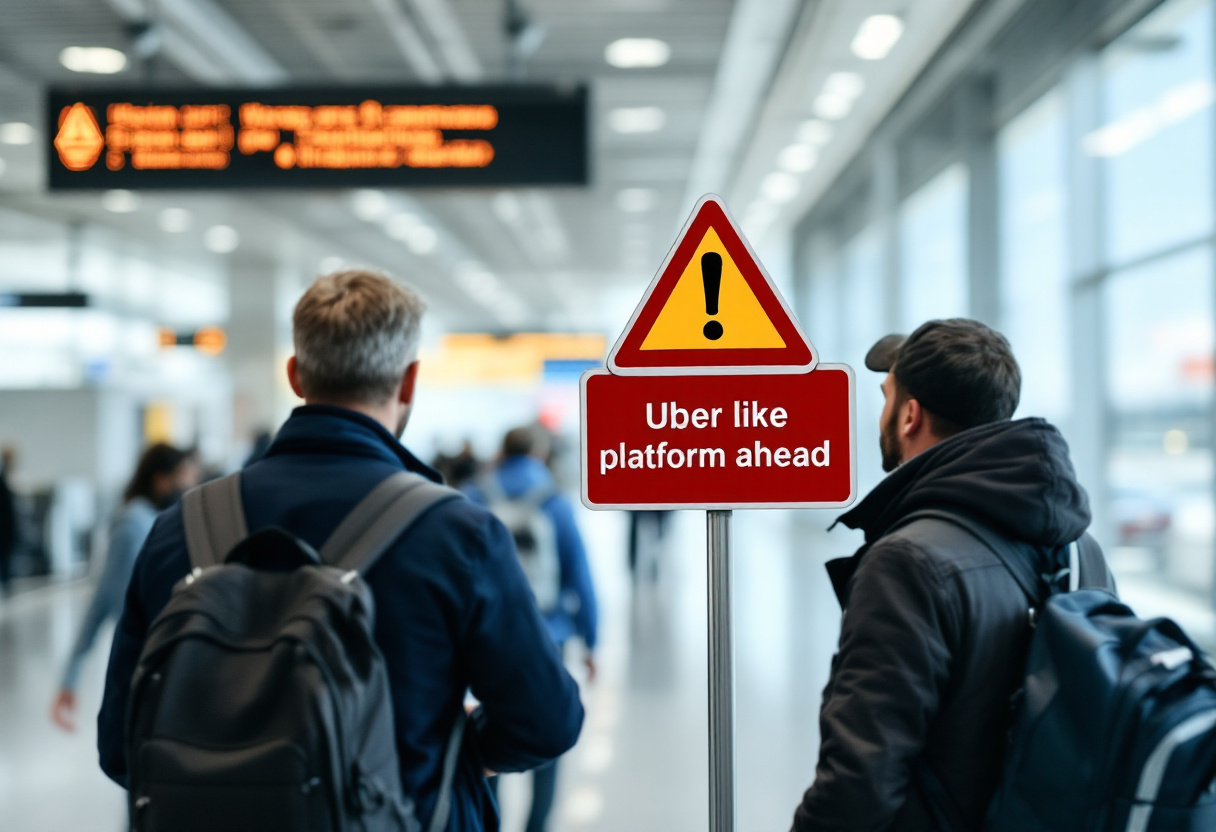GetTransfer is a Marketplace without price control but when it comes to on-demand rides, Uber is the household name. A growing number of web-based, Uber-like platforms are using websites rather than mobile apps while still bearing many operational similarities to the ride-hailing giant. Although these platforms may claim to serve as convenient connectors between travellers and local drivers, critics argue they exercise tight control over nearly every aspect of the service—from fare-setting to driver selection—much like Uber does through its smartphone application.

A web-only approach that mirrors Uber
Where Uber built its reputation on an app-based interface, these web-based Uber-like platforms rely on a website. Yet from a legal standpoint, whether you tap a screen or click a mouse is often immaterial. EU courts have repeatedly emphasised that what matters is the substance of the service: who manages pricing, how drivers are chosen, and whether the platform is simply an intermediary—or the real operator of the transport.
Many such platforms appear to organise rides in ways reminiscent of Uber’s core model:
• Centralised fare control: They determine the price you pay upfront and later allocate only a portion of that to the driver. Drivers cannot propose their own prices independently.
• No choice among drivers: Users are not presented with multiple offers or vehicle options; the platform alone decides which driver accepts the booking.
• In-house coordination: From the driver’s name to pickup details, the entire matching process is handled internally. The user simply pays the stated fare.
Total control over prices
One of the key legal questions is who sets the fare? Under a classic “marketplace” model, each driver would set his or her own rate, and the passenger would pick from a range of offers—akin to browsing different hotel deals or apartment rentals. By contrast, many web-based Uber-like platforms quote a single price—sometimes hidden behind “economy,” “business,” or “premium” labels—leaving drivers with little to no say.
Such control calls to mind Uber’s well-known surge pricing or dynamic fare calculations. While these website-driven services may not deploy the same demand-driven algorithms, they similarly fix transport costs at the outset. That structure puts them in the realm of “transport operator,” rather than a neutral listing site.
No driver choice: a single, pre-assigned option
In many online platforms—whether for rides, rentals, or freelance work—a user selects from multiple providers. But web-based Uber-like platforms often bypass that. Customers typically see driver information only after a driver is assigned, undermining the notion of open competition. You simply submit your travel details, and the platform decides who will show up, much like Uber automatically dispatches the nearest or next-available car. It can function as a “Black Box.”
This arrangement is crucial. EU case law holds that platforms remain mere “information society services” if they allow independent providers to manage their own fees and compete. Yet when the platform itself orchestrates key aspects—particularly price and supply—courts have interpreted it as a unified transport service.
Why the website vs. app distinction may be legally irrelevant
Some might believe a “website first” approach makes these services more of an intermediary than a provider. Legally, however, the difference between an app and a website is negligible; both are digital tools for connecting buyers and sellers. What matters is whether the platform simply facilitates a contract or effectively controls it. Because many web-based Uber-like platforms:
1. Set fares
2. Assign drivers without user selection
3. Handle all payment flows
…they exert much the same influence as a typical app-driven ride-hailing service.
Potential consequences
If regulators conclude these web-based Uber-like platforms are operating like Uber—a transport service rather than a mere aggregator—they could face:
• Licensing requirements: Local authorities might require the same type of taxi or private-hire authorisations that Uber must secure in many countries.
• Strict compliance: Inspections and other forms of scrutiny typically applied to transport operators (e.g., background checks on drivers, vehicle standards) could become mandatory.
• Fare and safety obligations: They might be subject to regulations on pricing transparency, insurance, or passenger safety—akin to local cab firms.
What this means for travellers
For travellers, the biggest question is who you’re really contracting with. If you believe you’re simply browsing various independent drivers, these platforms’ models may surprise you. While it can be convenient to have a set fare and a pre-assigned pickup, it also means you have little say over the driver’s background, ratings, vehicle choice, or potential cost comparisons before you pay.
On the other hand, if a platform is ultimately classified as a transport provider, you may gain enhanced consumer protection—similar to using a locally licensed taxi—while losing the “shop-around” freedom usually associated with open marketplaces.
What this means for business partners
Hotels, travel agencies, or other service providers that integrate web-based Uber-like platforms into their offerings—via booking links or recommendations—should be aware of potential regulatory uncertainties. If such a platform is deemed a transport operator subject to stricter licensing, business partners may:
• Face compliance checks: They could be questioned about promoting or facilitating an unlicensed service if the platform has not met local operator rules.
• Need to adjust contracts: Partnerships may require renegotiation to reflect any new licensing obligations or fare transparency requirements.
• Reassess liability risks: Should disputes arise over transport quality, safety, or cancellations, partners might share in legal or reputational fallout if the platform’s licensing status comes into question.
• Encounter additional tax issues: Obligations in certain countries may include paying taxes on behalf of an unlicensed or improperly licensed transport service.
• Take on new fees or licensing costs: Digital intermediation, limousine, or taxi licensing fees could suddenly apply, shifting liabilities to the party reselling or promoting those services.
If you partner with a transportation service provider lacking the proper licence, you could ultimately bear legal or financial exposure in certain jurisdictions.
The bigger picture
The rise of web-based Uber-like platforms underscores a broader phenomenon: as new companies adopt or adapt Uber’s operational methods, legal classifications become more complex. Many such platforms assert they are merely “connecting” users to drivers, even as they set fares and control nearly every step of the journey. Courts and regulators increasingly question these claims. As with Uber, the final determination can dictate whether the platform must follow local transport regulations akin to those facing traditional taxi operators.
Regardless of their “web-based” approach, the core issue remains: Are they truly a digital go-between, or the de facto operator of your transfer?
In practice, by running everything through a website and deciding prices and driver allocations behind the scenes, these platforms may well land in the same regulatory category as Uber—website or not.
UK-specific note on operator licences
In the United Kingdom, the law treats any business that sets prices and arranges rides as a private-hire operator, subject to local licensing and regulation. Because many web-based Uber-like platforms control fares and effectively organise transport, they would likely need an operator licence to operate lawfully in the UK. Failing to secure such a licence could expose them to legal challenges by authorities overseeing private-hire activities—much like Uber’s own regulatory battles.



Comments